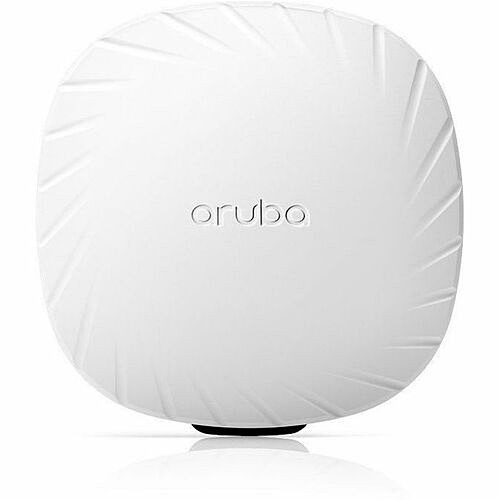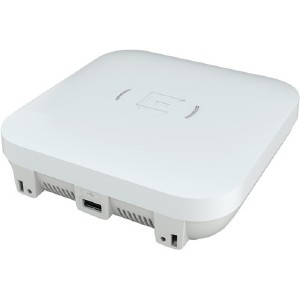HPE AP-503 Dual Band IEEE 802.11ax 1.49 Gbit/s Wireless Access Point - Indoor - 2.40 GHz, 5 GHz - Internal - MIMO Technology - 1 x Network (RJ-45) - Gigabit Ethernet - 10.90 W - Ceiling Mountable, Rail-mountable S2C07A
S2C07A | Aruba Networks®
New Listing!
Part Number: S2C07A
Condition: New
In Stock:
Out of stock
Real time availability 
Notify Me
Product Specifications
HPE AP-503 Dual Band IEEE 802.11ax 1.49 Gbit/s Wireless Access Point - Indoor - 2.40 GHz, 5 GHz - Internal - MIMO Technology - 1 x Network (RJ-45) - Gigabit Ethernet - 10.90 W - Ceiling Mountable, Rail-mountable S2C07A
HPE ANW AP-503 RW1 CAMPUS Access Point Wireless - PL-VL
Manufacturer Part Number: S2C07A
MANUFACTURER NAME: Aruba Networks
MANUFACTURER PART NUMBER: S2C07A
UPC EAN CODE: 190017688398
LANGUAGE: EN
MARKET:US
| General Information: | |
The Aruba 503 Series Access Points (APs) provide costeffective, high-performance connectivity for any organization experiencing device growth due to increased mobility, the shift to cloud, or IoT. With a maximum real-world aggregate data rate of 1.49 Gbps (HE80/HE20), the 503 Series deliver the speed and reliability needed for medium-density venues and workplaces such as schools, midsize offices, and retailers. Each 503 Series AP provides connectivity for a maximum of 256 associated clients per radio (512 in total). OPTIMIZED USER EXPERIENCE The 503 Series APs are designed to optimize user experience by maximizing Wi-Fi efficiency and dramatically reducing airtime contention between clients. Features include orthogonal frequency-division multiple access (OFDMA) and cellular optimization. With up to 2 spatial streams (2SS) and 80MHz channel bandwidth (HE80), the 503 Series provides the next generation of wireless capabilities for cost-conscious deployments. Advantages of OFDMA This capability allows Aruba's APs to handle multiple Wi-Fi 6 capable clients on each channel simultaneously, regardless of device or traffic type. Channel utilization is optimized by handling each transaction via smaller sub-carriers or resource units (RUs), which means that multiple clients are sharing a channel and not competing for airtime and bandwidth. Aruba Air Slice™ for application assurance Aruba Air Slice delivers application assurance in order to optimize the user experience. By allocating radio resources such as time, frequency, and spatial stream to specific traffic types, Aruba APs can provide SLA-grade performance to client devices whether they support Wi-Fi 6 or prior standards. Aruba Air Slice relies on Aruba's Policy Enforcement Firewall and Deep Packet Inspection (DPI) to identify user roles and applications so that bandwidth can be dynamically allocated to ensure performance. Air Slice is available for APs running controller-less mode (Instant) and with Aruba Central; controller-based APs will be supported in a future software release. Wi-Fi 6 aware client optimization Aruba's patented AI-powered ClientMatch technology eliminates sticky client issues by placing Wi-Fi 6 capable devices on the best available AP. Session metrics are used to steer mobile devices to the best AP based on available bandwidth, types of applications being used, and traffic type - even as users roam. Resource management with AirMatch To better support growth in client device density and in data volumes, AirMatch uses machine learning techniques that provide automated radio frequency optimization. | |
| Manufacturer | Hewlett Packard Enterprise |
| Manufacturer Part Number | S2C07A |
| Manufacturer Website Address | http://www.hpe.com |
| Brand Name | HPE |
| Product Series | 503 |
| Product Model | AP-503 |
| Product Name | AP-503 Wireless Access Point |
| Product Type | Wireless Access Point |
| Product UPC | 190017688398 |
| Technical Information: | |
| Wireless LAN Standard | IEEE 802.11ax |
| Network Band | Dual Band |
| Frequency Band | 5 GHz
2.40 GHz |
| Indoor/Outdoor | Indoor |
| Wireless Transmission Speed | 1.49 Gbit/s |
| MIMO Technology | Yes |
| Beamforming Technology | Yes |
| Data Encryption | Yes |
| Encryption Standard | WPA3-Personal
WPA3-SAE WPA3-ENT WPA2 WPA |
| Interfaces/Ports: | |
| Ethernet Technology | Gigabit Ethernet |
| Number of Network (RJ-45) Ports | 1 |
| PoE PD Port | Yes |
| USB | Yes |
| USB Standard | USB 2.0 |
| Power Description: | |
| Power Consumption | 10.90 W |
| Physical Characteristics: | |
| Form Factor | Ceiling Mountable
Rail-mountable |
| Antenna Form Factor | Internal |
| Height | 1.4" |
| Width | 5.7" |
| Depth | 5.7" |
| Weight (Approximate) | 8.99 oz |
Questions and Answers
Questions and Answers | Ask CompSource |
Shipping / Returns
Shipping
Ground =
FREE
(Delivery within 2-7 business days)
Two Day Air = $25.00
(Delivery within 2 business days)
Standard One Day = $35.00
(Delivery within next business day)
Priority = $45.00
(Delivery within next business morning)
U.S Mail Priority (AA,AE,AP only) = $30.00
FedEx International Economy (Canada only) = $85.00
Typically out of stock items are filled within 1 to 14 business days but can and may take longer.
Shipping dates are best estimates based on product location and may vary with holidays.
If product requires trucking, additional fees may apply.
* Some destinations are subject to Applicable State/Duty Taxes
Returns
CompSource realizes that every product may have different return guidelines. Please see the policy below regarding this item.
This Product Has Limited Exchange Privileges.
Please call for return guidelines.
For support on this product, please contact Aruba Networks.
Aruba Networks Company's Information
Product Reviews
Overall Rating | Write a Review
|
|
Best Sellers
More Best Sellers
Rebates
More Rebates
Learn more about Wireless Access Points
Switches, routers, and wireless access points
Switches, routers, and wireless access points perform very different functions in a network.
A computer network, or data network, is a digital telecommunications network which allows nodes to share resources. In computer networks, computing devices exchange data with each other using connections (data links) between nodes These data links are established over cable media such as wires or optic cables, or wireless media such as WiFi.Switches
Switches are the foundation of most business networks. A switch acts as a controller, connecting computers, printers, and servers to a network in a building or a campus.
Switches allow devices on your network to communicate with each other, as well as with other networks, creating a network of shared resources. Through information sharing and resource allocation, switches save money and increase productivity.
There are two basic types of switches to choose from as part of your networking basics: managed and unmanaged.
- An unmanaged switch works out of the box but can't be configured. Home-networking equipment typically offers unmanaged switches.
- A managed switch can be configured. You can monitor and adjust a managed switch locally or remotely, giving you greater control over network traffic and access.
Routers
Routers connect multiple networks together. They also connect computers on those networks to the Internet. Routers enable all networked computers to share a single Internet connection, which saves money.
A router acts a dispatcher. It analyzes data being sent across a network, chooses the best route for data to travel, and sends it on its way.
Routers connect your business to the world, protect information from security threats, and can even decide which computers receive priority over others.
Beyond those basic networking functions, routers come with additional features to make networking easier or more secure. Depending on your needs, for example, you can choose a router with a firewall, a virtual private network (VPN), or an Internet Protocol (IP) communications system.
Access points
An access point* allows devices to connect to the wireless network without cables. A wireless network makes it easy to bring new devices online and provides flexible support to mobile workers.
An access point acts like an amplifier for your network. While a router provides the bandwidth, an access point extends that bandwidth so that the network can support many devices, and those devices can access the network from farther away.
But an access point does more than simply extend Wi-Fi. It can also give useful data about the devices on the network, provide proactive security, and serve many other practical purposes.
*Access points support different IEEE standards. Each standard is an amendment that was ratified over time. The standards operate on varying frequencies, deliver different bandwidth, and support different numbers of channels.
Wireless networking
Wireless networking is a method by which homes, telecommunications networks and business installations avoid the costly process of introducing cables into a building, or as a connection between various equipment locations.CompSource will educate and help make this process enjoyable and easy.
Whether you're planning on using your network for basic home tasks or enterprise level security. You can tell our trained sales professionals your needs, and we�ll make custom recommendations to suit your specifications and budget. Our reps have extensive knowledge and love to share. We educate, not sell, CompSource makes sure you buy what you need and not waste money on what you don't. As with every decision we never push, it's up to you when, and if you make a purchase.
CompSource has a great technical staff that can help with a solution for your exact needs.
Chat with us or give our professionals a quick phone call (800)-413-7361.
Thank you very much. I appreciate your help today. swaxmanMore Reviews
























